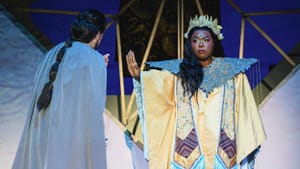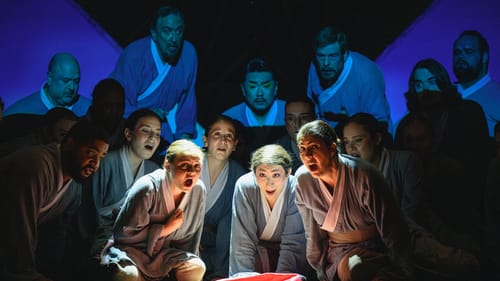A new ending for a grand opera
OperaDelaware presents Puccini’s Turandot

OperaDelaware closed its season with an ambitious and impressive production of Turandot, one of the grandest of grand operas, gifted (or laden) with one of the most improbable plots in the operatic canon. It tells of the icy Princess Turandot, who vows she will marry only a suitor who can answer three enigmatic riddles. All who fail are executed.
Turandot opens in ancient Beijing as the unsuccessful Prince of Persia goes to his death, and among the spectators milling about are Calaf (tenor John Pickle), the slave girl Liù (soprano Karen Vuong), and her elderly master Timur (bass Zaikuan Song). Calaf quickly recognizes Timur as his father, the former King of Tartary. Both have been exiled, wandering the world, and happen to find themselves here.
When the much-feared Turandot (soprano Michelle Johnson) appears, Calaf is smitten by her beauty and vows to solve her riddles. Three court ministers—Ping (baritone André Chiang), Pang (tenor Nicholas Nestorak), and Pong (tenor Jeremy Blossey)—try to dissuade this unknown prince, but he remains resolved, striking the massive gong and entering the grisly competition.
Calaf answers the riddles and then issues Turandot a challenge of his own. If she can discover his name by morning, he will pay with his life. The princess decrees that no one in the city may sleep until his name is revealed. Timur and Liù have been seen talking to Calaf, and Turandot orders them to reveal the name. Liù says she alone knows it but refuses to betray him, killing herself to keep it secret. Calaf finally reveals who he is, putting his life in Turandot’s hands. But at dawn, as the court assembles, the princess proclaims that his name is Love.
Gozzi, Puccini, and Wang
Turandot is based on a commedia dell’arte play by Count Carlo Gozzi, a champion of that traditional Italian form whose works were adapted by both dramatists and composers. Turandot was among Gozzi’s best-known fiabe (fairy tales), and Giacomo Puccini (1858-1924) died before he finished his operatic version, completed by Franco Alfano and premiered in 1926. Unlike Opera Philadelphia for its recent Madame Butterfly, OperaDelaware (while it features many Asian artists) chose not to address the show's Orientalist roots or history of yellowface productions, which continue today.
Conductor Arturo Toscanini rewrote Alfano’s ending, and that Alfano/Toscanini ending is the most often heard, but OperaDelaware commissioned composer and librettist Derrick Wang to create a new conclusion. Wang, who wrote the popular opera Scalia/Ginsberg, calls himself a “musical dramatist and forensic musicologist,” skills heard clearly here. Using the original (completed) libretto, Wang has crafted a respectful, musically adept, and relatively seamless new ending.
An expertly tailored score
Maestro Anthony Barrese, the company’s music director, conducted his orchestral reduction of Puccini’s score, expertly tailoring it for smaller forces. The Grand is as intimate as opera houses go (seating only 1,100); though in a few places the thinner orchestration lacked some of the original’s musical dimension, Barrese elicited expressive and dramatic playing from the OperaDelaware orchestra.
Turandot is filled with musical riches and memorable arias, including Calaf’s beloved Nessun dorma (No one sleeps). This gorgeous aria usually stops the show, and—beautifully rendered by Pickle—it did so here. There is also magnificent lyric music for Liù, which Vuong sang with perfection, including her heart-stopping pianissimo high B-flats.
Depth, power, and dynamism
The role of Turandot calls for a dramatic soprano with depth and power who can easily access its high Bs and Cs, a difficult vocal combination. The role is also a challenging mix of opposites: stentorian but always musical, never strident, and seductive even while proclaiming independence and inaccessibility. Turandot’s first appearance, almost halfway through the opera, must also fulfill the audience’s built-up expectations. Johnson sang the role with power and steely dynamism, and though her singing felt somewhat forced at the start, she became more at ease in this demanding part as the evening progressed and the character’s icy demeanor began to melt.
Referencing its commedia roots, Turandot’s three court ministers provide intermittent comedy and could verge on caricature. But here they also brought moments of depth and reflection, especially in the cinematic-sounding trio where Chiang beautifully depicted Ping’s longing for his home “on a lake surrounded by bamboo” and the trio depicted the personal sacrifices required to remain in Turandot’s cruel court.
Puccini’s music box
Haunting “music box songs” float throughout, all rendered beautifully by the offstage Wilmington’s Children’s Chorus. Evidently, an Italian diplomat gave Puccini a music box that played four Chinese melodies, and the composer utilized three, including the folk melody "Jasmine Flower" as Turandot’s leitmotif.

One of the reasons a production of Turandot is a rarity (and always an event) is that it’s truly a choral opera, requiring a first-rate versatile ensemble. The chorus sings constantly: exciting music that’s rangy in both pitch and emotional content, and under chorus master George Hemcher, the 26-voice OperaDelaware chorus hit every mark.
Staging challenges
The most problematic part of this production was the staging by director Xinxin Tang in her company debut. She sought to explore the fantasy world that Puccini created, and the opera’s fairy-tale elements and hard-to-believe scenarios call for opulent and magical staging.
While the hall’s acoustics are very fine, the Grand’s stage configuration makes it challenging to stage large groups. Tang blocked Turandot’s chorus as an amorphous mob moving in synchronicity, an interesting choice but one that made for some clunky staging. And Princess Turandot (considered a deity by virtue of her royal lineage) slipped in and out among the hoi-polloi, standing on the same level with them in most of her appearances rather than being elevated above lesser mortals.
Periodically, Emperor Altoum (Turandot’s father, the “Son of Heaven”) makes a majestic appearance, typically staged in some unusual way. Here, in Tang’s striking departure, a magnificent ceremonial robe was theatrically displayed as Michael McCauley sang the role offstage, a controversial directorial conceit, one with dramatic heft that also raised the question of whether the character was alive or was a disembodied spirit.
Eloquent lighting by Tláloc Lopez-Watermann and opulent scenic projections by Jing Wang were central to the show’s success. The setting, replete with Art Deco overtones that spoke to the date of the work’s premiere, featured a large central medallion, a perfect canvas for the shifting illustrative images and rich colors that stunningly fulfilled the opera’s rangy scenic locales and emotional shifts.
Say it however you like
Opera aficionados are passionate about how to pronounce the name of this opera, sometimes saying the final “t,” sometimes not. Barrese devoted his program notes to the controversy, but audience chatter indicated that the takeaway is to say it however you like.
A performance of this unfinished work is always an event, and this Turandot was no exception, visually beautiful and excellently sung. The audience was excited to be there and rewarded the production’s beauty and excellent musicianship with fervent applause and delighted bravos.
What, When, Where
Turandot. Score by Giacomo Puccini, libretto by Giuseppe Adami and Renato Simoni. Final two acts in this production composed by Derrick Wang; Conducted by Anthony Barrese; directed by Xinxin Tang. Opera Southwest and Fargo-Moorhead Opera. May 17 and 19, 2024, at the Grand, 818 N Market Street, Wilmington. (302) 442-7807 or operade.org.
Accessibility
Performed in Italian with English supertitles. The Grand’s entrance is street level, and the venue is equipped with elevators and wheelchair accessibility/seating.
Sign up for our newsletter
All of the week's new articles, all in one place. Sign up for the free weekly BSR newsletters, and don't miss a conversation.

 Gail Obenreder
Gail Obenreder